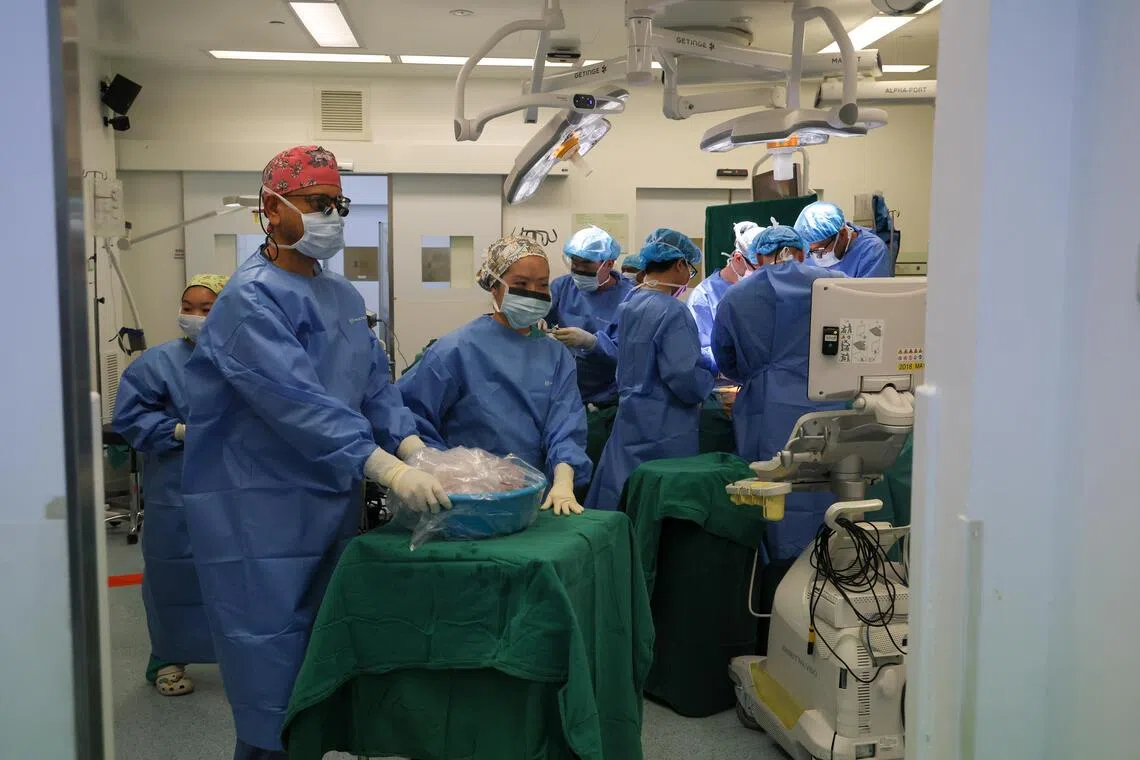Organ transplant rates up over the past decade for life-saving donations, medical research
Sign up now: Get ST's newsletters delivered to your inbox

A transplant team transporting a portion of a donor’s liver to the recipient at the National University Centre for Organ Transplantation (NUCOT).
PHOTO: LIAHE ZAOBAO
SINGAPORE – Organ donation is legally enforced in Singapore to help boost donation rates and save more lives, unless the Singapore citizen or resident chooses to opt out.
Despite this, more than 400 patients in Singapore face waiting periods of five to 17 years for a suitable life-saving transplant. One reason is that grieving families refuse to proceed with organ donation, and their wishes are usually respected.
Yet, the latest figures from the Ministry of Health (MOH) show that rates of deceased organ transplant have inched upwards in the last 10 years.
The rate of dead donors who donated kidneys rose from 6.3 people per million population (pmp) in 2013 to 6.59 pmp in 2023. Over the same period, rates of liver donations from dead donors grew from 3.52 pmp to 3.89 pmp, while heart donations from deceased donors increased from 0.74 pmp to 0.85 pmp.
Individuals can choose to donate their organs and bodies to save lives, support research, or advance medical science through the Medical (Therapy, Education and Research) Act (MTERA) or by contributing to Brain Bank Singapore.
MTERA is an opt-in scheme, where people pledge their organs or any body parts for transplant, education or research after they die. Under this law, organ donation for transplant takes precedence over that for education or research, said an MOH spokesperson.
An individual can also choose to donate his whole body after death under MTERA. From 2020 to 2024, more than 500 individuals pledged each year to make whole-body donations through this programme.
After death, the body is collected within six hours and sent to institutions such as the Yong Loo Lin School of Medicine at the National University of Singapore and the Lee Kong Chian School of Medicine at the Nanyang Technological University to be used for studying anatomy and training future doctors.
According to the MOH spokesperson, if the family wishes to hold a wake for up to three days before the donation, transplant coordinators will work with the assigned medical school for a suitable time to collect the body.
The medical school keeps the bodies for up to three years for educational and research purposes before cremating them. Families will then be notified to collect the ashes. If they prefer not to do so, the ashes will be buried at sea.
It was only in the last six years that brain donation became established in Singapore. With the launch of Brain Bank Singapore in 2019, donated human brains for research purposes are retrieved and stored at the bank.
To donate under MTERA, log in to the Organ Donor Registry with Singpass to update your donor status. Should you prefer to mail in completed hard-copy form(s), send them to:
National Organ Transplant Unit
c/o Singapore General Hospital Block 3, Level 1
Singapore 169608
To pledge your brain to Brain Bank Singapore, log in to its website at to sign up.



